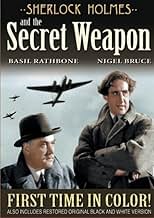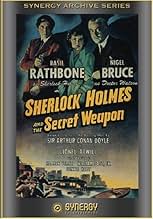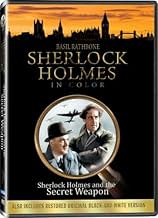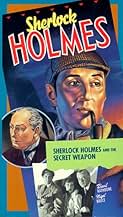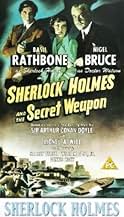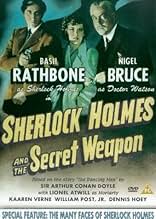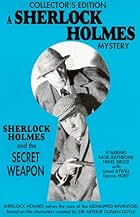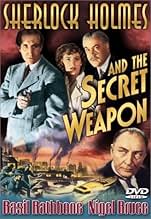Sherlock Holmes y la mira secreta
Título original: Sherlock Holmes and the Secret Weapon
CALIFICACIÓN DE IMDb
6.5/10
7.1 k
TU CALIFICACIÓN
Sherlock Holmes y el doctor Watson se enfrentan al colaboracionista nazi Profesor Moriarty. Moriarty tiene entre sus planes secuestrar a un científico británico que ha creado una nueva mira ... Leer todoSherlock Holmes y el doctor Watson se enfrentan al colaboracionista nazi Profesor Moriarty. Moriarty tiene entre sus planes secuestrar a un científico británico que ha creado una nueva mira de bombardero para atacar al ejército alemán.Sherlock Holmes y el doctor Watson se enfrentan al colaboracionista nazi Profesor Moriarty. Moriarty tiene entre sus planes secuestrar a un científico británico que ha creado una nueva mira de bombardero para atacar al ejército alemán.
- Dirección
- Guionistas
- Elenco
Karen Verne
- Charlotte Eberli
- (as Kaaren Verne)
Rudolph Anders
- Braun
- (sin créditos)
Ted Billings
- Barfly
- (sin créditos)
Whit Bissell
- London Bobbie
- (sin créditos)
Veda Ann Borg
- Bar Singer
- (voz)
- (sin créditos)
Paul Bryar
- Swiss Waiter
- (sin créditos)
John Burton
- RAF Officer
- (sin créditos)
Vicki Campbell
- Woman RAF Pilot
- (sin créditos)
Gerard Cavin
- Scotland Yard Man
- (sin créditos)
Harry Cording
- Jack Brady
- (sin créditos)
James Craven
- RAF Officer Watching Bombsight Test
- (sin créditos)
Opiniones destacadas
Sherlock Holmes (Basil Rathbone) smuggles a Swiss inventor of a new bombsight into England and out of Nazi hands. But when the inventor is kidnapped right from under the nose of Scotland Yard, Holmes discovers it's not just the Nazis he has to contend with but his old nemesis Professor Moriarty (Lionel Atwill) as well.
The second in Universal's highly enjoyable Sherlock Holmes series is also the first directed by Roy William Neill, who would direct every Universal Holmes film after this. This is also the first appearance of Inspector Lestrade (Dennis Hoey), a pleasant addition to the series. Rathbone and Nigel Bruce are excellent, as usual. Rathbone gets to dress up in a few disguises, which are fun. He's still sporting that silly haircut from Voice of Terror. Lionel Atwill is a good Moriarty. Not the series' best but still very good. Any movie that features Basil Rathbone vs Lionel Atwill is one where you will be entertained.
For some reason, as with other WWII Holmes movies, a lot of reviewers seem to really hate the idea of Sherlock Holmes fighting against the Nazis or for England. They claim Holmes was never intended for "propaganda" and that he should be left to simple detective stories. Someone should have told Sir Arthur Conan Doyle that when he wrote "His Last Bow," a WWI-era story which saw Holmes helping his country catch German spies.
The second in Universal's highly enjoyable Sherlock Holmes series is also the first directed by Roy William Neill, who would direct every Universal Holmes film after this. This is also the first appearance of Inspector Lestrade (Dennis Hoey), a pleasant addition to the series. Rathbone and Nigel Bruce are excellent, as usual. Rathbone gets to dress up in a few disguises, which are fun. He's still sporting that silly haircut from Voice of Terror. Lionel Atwill is a good Moriarty. Not the series' best but still very good. Any movie that features Basil Rathbone vs Lionel Atwill is one where you will be entertained.
For some reason, as with other WWII Holmes movies, a lot of reviewers seem to really hate the idea of Sherlock Holmes fighting against the Nazis or for England. They claim Holmes was never intended for "propaganda" and that he should be left to simple detective stories. Someone should have told Sir Arthur Conan Doyle that when he wrote "His Last Bow," a WWI-era story which saw Holmes helping his country catch German spies.
In the Universal series of modern Sherlock Holmes stories with Basil Rathbone and Nigel Bruce, SHERLOCK HOLMES AND THE SECRET WEOPON is not one of the top films - although it is entertaining. I think the problem with it is that much of the film's "dueling" between Holmes and his nemesis Moriarty (here played by Lionel Atwill) seems to delay the actual point of the Professor's work.
Moriarty appears in three of the Holmes films with Rathbone. In THE ADVENTURES OF SHERLOCK HOLMES he was played by George Zucco, who gave real relish to the love of villainy for its own sake to the role. For my money Zucco's performance as the Professor was the best of the three (there is even a brief moment of comedy in his performance, when he's disguised as the "Sergeant of Police" towards the end - like he's preparing to sing "A Policeman's Lot" from Gilbert & Sullivan). Next comes Mr. Atwill's performance here - more of that later. Finally there is Henry Daniell's intellectual Moriarty in SHERLOCK HOLMES AND THE LADY IN GREEN. It's a typically cool, classy performance by Mr. Daniell, but his confrontations with Holmes seem to be a tedious bore to him. They keep him from completing the main plan. In the stories that the Professor pops up in, he really senses Holmes is a nemesis who will remain a danger as long as he is alive. Yet, because of the intellectual tennis match between him and Rathbone, Rathbone (in his autobiography) actually felt Daniell was the best of the film Moriartys.
If Zucco captured the love of evil in the Professor, and Daniell seemed to demonstrate the tired Oxford Don (in the stories the Professor is a well regarded mathematician, whose volume on the binomial theorem had a "European vogue", and who wrote an intriguing book, THE DYNAMICS OF THE ASTEROID), Atwill demonstrates the Professor as pragmatic businessman. First of all, he's sold his services (apparently) to Nazi Germany. This is never gone into, but one presumes (as this is before the Nazis began to really collapse) he figures they will win the war. Secondly, he is not a fool. When Dr. Tobel (William Post Jr.) has shown he is a state of near physical collapse due to the torturing of Moriarty's gang, the Professor decides to kidnap one of the other scientists who are assisting Tobel, because he's as good a scientist as Tobel and would be able to put together the bomb site. I somehow can't quite see Zucco making such a sensible decision on the spot, and if Daniell had to make it, he would seem annoyed that there is yet another delay to his plans.
By the way, one trick used in all the Holmes series regarding the Professor is how to rid the film of him. If you read the Holmes stories, Moriarty appears as the villain three times: in THE MEMOIRS OF SHERLOCK HOLMES' last story ("THE ADVENTURE OF THE FINAL PROBLEM"), in THE RETURN OF SHERLOCK HOLMES' first story ("THE ADVENTURE OF THE EMPTY HOUSE") and the last of the four novels/novellas (THE VALLEY OF FEAR). It's amazing how much mileage the Professor got out of so few appearances (he is mentioned in two or three other stories as well - in passing). But because of his fate at the Reichenbach Falls in "THE FINAL PROBLEM" and "THE EMPTY HOUSE", we always see him fall to his death. Zucco falls off the White Tower on Tower Hill. Daniell (with more imagination) tries to flee Gregson and the police, but is shot as he jumps, and wounded fails to hold on to the wall of an adjacent building. Atwill (here it is not seen, but heard) seems to fall down a trap door he's planted in an escape tunnel). It is really tedious after awhile to see the Professor always fall in these films. One turns to the Gene Wilder comedy (admittedly a comedy) SHERLOCK HOLMES' SMARTER BROTHER, wherein Leo McKern is a wonderfully wacky and villainous Moriarty (complete, finally, with an Irish accent), who is not killed at the end, but just left mulling - in a rowboat - over how his careful schemes did not work out. I rather liked that better.
The use of the "Dancing Men" code here, like the use of the "Devil's Foot Root" in DRESSED TO KILL, snags a part of a mystery from a short story. "THE ADVENTURE OF THE DANCING MEN" appeared in THE RETURN OF SHERLOCK HOLMES, and deals with a client of Holmes whose wife has been getting weird, blood-curdling messages in this code. Charles Higham, in his biography THE ADVENTURES OF CONAN DOYLE suggests Sir Arthur may have picked up the code from a magazine game in the 1870s, but we really don't know. The code is basically one of letter substitutions for the figures of the dancing men. The story in the short story is dramatic, but deals with a triangle. The only innovation in the film is that Tobel makes a slight change that confuses both Holmes and Moriarty.
The film will entertain, but I still think THE HOUSE OF FEAR, THE SCARLET CLAW, and SHERLOCK HOLMES FACES DEATH are better films.
Moriarty appears in three of the Holmes films with Rathbone. In THE ADVENTURES OF SHERLOCK HOLMES he was played by George Zucco, who gave real relish to the love of villainy for its own sake to the role. For my money Zucco's performance as the Professor was the best of the three (there is even a brief moment of comedy in his performance, when he's disguised as the "Sergeant of Police" towards the end - like he's preparing to sing "A Policeman's Lot" from Gilbert & Sullivan). Next comes Mr. Atwill's performance here - more of that later. Finally there is Henry Daniell's intellectual Moriarty in SHERLOCK HOLMES AND THE LADY IN GREEN. It's a typically cool, classy performance by Mr. Daniell, but his confrontations with Holmes seem to be a tedious bore to him. They keep him from completing the main plan. In the stories that the Professor pops up in, he really senses Holmes is a nemesis who will remain a danger as long as he is alive. Yet, because of the intellectual tennis match between him and Rathbone, Rathbone (in his autobiography) actually felt Daniell was the best of the film Moriartys.
If Zucco captured the love of evil in the Professor, and Daniell seemed to demonstrate the tired Oxford Don (in the stories the Professor is a well regarded mathematician, whose volume on the binomial theorem had a "European vogue", and who wrote an intriguing book, THE DYNAMICS OF THE ASTEROID), Atwill demonstrates the Professor as pragmatic businessman. First of all, he's sold his services (apparently) to Nazi Germany. This is never gone into, but one presumes (as this is before the Nazis began to really collapse) he figures they will win the war. Secondly, he is not a fool. When Dr. Tobel (William Post Jr.) has shown he is a state of near physical collapse due to the torturing of Moriarty's gang, the Professor decides to kidnap one of the other scientists who are assisting Tobel, because he's as good a scientist as Tobel and would be able to put together the bomb site. I somehow can't quite see Zucco making such a sensible decision on the spot, and if Daniell had to make it, he would seem annoyed that there is yet another delay to his plans.
By the way, one trick used in all the Holmes series regarding the Professor is how to rid the film of him. If you read the Holmes stories, Moriarty appears as the villain three times: in THE MEMOIRS OF SHERLOCK HOLMES' last story ("THE ADVENTURE OF THE FINAL PROBLEM"), in THE RETURN OF SHERLOCK HOLMES' first story ("THE ADVENTURE OF THE EMPTY HOUSE") and the last of the four novels/novellas (THE VALLEY OF FEAR). It's amazing how much mileage the Professor got out of so few appearances (he is mentioned in two or three other stories as well - in passing). But because of his fate at the Reichenbach Falls in "THE FINAL PROBLEM" and "THE EMPTY HOUSE", we always see him fall to his death. Zucco falls off the White Tower on Tower Hill. Daniell (with more imagination) tries to flee Gregson and the police, but is shot as he jumps, and wounded fails to hold on to the wall of an adjacent building. Atwill (here it is not seen, but heard) seems to fall down a trap door he's planted in an escape tunnel). It is really tedious after awhile to see the Professor always fall in these films. One turns to the Gene Wilder comedy (admittedly a comedy) SHERLOCK HOLMES' SMARTER BROTHER, wherein Leo McKern is a wonderfully wacky and villainous Moriarty (complete, finally, with an Irish accent), who is not killed at the end, but just left mulling - in a rowboat - over how his careful schemes did not work out. I rather liked that better.
The use of the "Dancing Men" code here, like the use of the "Devil's Foot Root" in DRESSED TO KILL, snags a part of a mystery from a short story. "THE ADVENTURE OF THE DANCING MEN" appeared in THE RETURN OF SHERLOCK HOLMES, and deals with a client of Holmes whose wife has been getting weird, blood-curdling messages in this code. Charles Higham, in his biography THE ADVENTURES OF CONAN DOYLE suggests Sir Arthur may have picked up the code from a magazine game in the 1870s, but we really don't know. The code is basically one of letter substitutions for the figures of the dancing men. The story in the short story is dramatic, but deals with a triangle. The only innovation in the film is that Tobel makes a slight change that confuses both Holmes and Moriarty.
The film will entertain, but I still think THE HOUSE OF FEAR, THE SCARLET CLAW, and SHERLOCK HOLMES FACES DEATH are better films.
There are times when Holmes and Watson seem just a bit out of place in the World War II setting, but "Sherlock Holmes and the Secret Weapon" still has enough of the Holmes flavor to be worth watching. It's mostly enjoyable, with Holmes's usual deductions, disguises, and the like making up for the occasional war-time messages that come in from time-to-time. There are also some good moments of suspense, plus some pleasantly offbeat plot details, to keep your attention.
The plot gets pretty involved, with Holmes involved in protecting an inventor whose ideas the Nazis would like to get hold of. Some good turns follow as everything is played out in an interesting battle of wits. The supporting cast includes Lionell Atwill and Dennis Hoey, who are solid as Moriarty and Lestrade, respectively, plus Kaaren Verne.
Overall, most fans of the Rathbone/Bruce series should find it an enjoyable feature.
The plot gets pretty involved, with Holmes involved in protecting an inventor whose ideas the Nazis would like to get hold of. Some good turns follow as everything is played out in an interesting battle of wits. The supporting cast includes Lionell Atwill and Dennis Hoey, who are solid as Moriarty and Lestrade, respectively, plus Kaaren Verne.
Overall, most fans of the Rathbone/Bruce series should find it an enjoyable feature.
This jingoist outing concerns the usual battle Holmes vs. Moriaty , but this time in an effort to save the British war against the Nazis . Sherlock Holmes (Rathbone) and Watson (Bruce), the detecting duo living in 223 Baker Street , again are up against their old enemy Dr. James Moriarty (Lionel Atwill , he earlier performed Mortimer in Hound of the Baskerville , 1939). The film starts in Switzerland where Holmes saves from the Nazis to an inventor scientific of a bomb-sight , named Dr. Tobel (Post). Back in London , Tobel hand over four parts of the device to diverse scientists . But Doctor Tobel is kidnapped by Moriarty . Sherlock must solve his disappearance and some vitally important . Sherlock helps Inspector Lestrade of Scotland Yard (Dennis Hoey , this was was the first of Universal's Sherlock Holmes series in which he appeared) resolve the case . Holmes only holds a clue left by his girlfriend (Kareen Verne) , the detective with an extraordinary mechanism gets decode it . But scientists dead bodies are accumulating , they have appeared murdered and Moriarty knows the keys , as well . Holmes disguised as a sailor goes out to investigate , finding the Moriarty's shelter . The picture is based on ¨The dancing men¨ by Arthur Conan Doyle . This is a Rathbone-Bruce effort for the WWII along with ¨The voice of terror¨ in which we are asked for believe the magnificent detective could have lived in this century . Both stories are completely patriotic and flag-waging movies . In fact , on the end there's an advertising about buying of war bonds with evident propaganda .
The movie is an excellent Holmes thriller with gripping wartime setting , unanswered mysteries and unstopped suspense . In the film appears the ordinaries from Holmes series : his nemesis Moriarty , Mistress Hudson , Inspector Lestrade (a funny Dennis Hoey) and , of course , the bumbling Dr. Watson . Basil Rathbone performance is splendid , he's the best cinema's Holmes , similar to television's Peter Cushing and Jeremy Brett . Rathbone as whimsical sleuth is top notch , he's in cracking form , intelligent , broody and impetuous . He's finely matched in battle of wits with Moriarty , his arch-enemy , a first-range villain : Lionel Atwill . Nigel Bruce plays Watson with humor , jinx , goofy and mirth . He's the perfect counterpoint to Holmes. Besides , appearing briefly distinguished secondaries as Paul Fix and Whit Bissell . This classic gets an atmospheric black and white cinematography , but available colorized in a horrible version . Adequate music score fitting to suspense by Frank Skinner . This was the second Holmes feature to be produced and professionally realized at Universal and it was the first to be directed by Roy William Neill , the usual saga director and habitual in the Universal monsters movies .
The movie is an excellent Holmes thriller with gripping wartime setting , unanswered mysteries and unstopped suspense . In the film appears the ordinaries from Holmes series : his nemesis Moriarty , Mistress Hudson , Inspector Lestrade (a funny Dennis Hoey) and , of course , the bumbling Dr. Watson . Basil Rathbone performance is splendid , he's the best cinema's Holmes , similar to television's Peter Cushing and Jeremy Brett . Rathbone as whimsical sleuth is top notch , he's in cracking form , intelligent , broody and impetuous . He's finely matched in battle of wits with Moriarty , his arch-enemy , a first-range villain : Lionel Atwill . Nigel Bruce plays Watson with humor , jinx , goofy and mirth . He's the perfect counterpoint to Holmes. Besides , appearing briefly distinguished secondaries as Paul Fix and Whit Bissell . This classic gets an atmospheric black and white cinematography , but available colorized in a horrible version . Adequate music score fitting to suspense by Frank Skinner . This was the second Holmes feature to be produced and professionally realized at Universal and it was the first to be directed by Roy William Neill , the usual saga director and habitual in the Universal monsters movies .
In the midst of WWII, Holmes is involved in the protection of a scientist working on a secret weapon that may prove to be a turning point against the Nazi's. When the scientist and his formulae goes missing, Holmes becomes involved in a rush to rescue the man and prevent nemesis Professor Moriarty getting hold of the rest of the formulae.
Although I'm not a major fan of the Holmes films where he finds himself in the modern day world, this is one of the better ones I have seen thus far. The plot is a little thick at the start but really gets going when the scientist goes missing. The investigation by Holmes is very engaging and the climax has a nice couple of scenes where Holmes and Moriarty match wits.
Rathbone makes a good Holmes as always and here he happily hasn't as bad a haircut as he did in some of the modern films. Bruce is much better than usual - he is less of a mug and is made less fun of by Holmes, he actually shows a bit of sense about him. Indeed so does Lestrade (Hoey), so often a comedy figure, it's nice to see him involved a bit more than usual! Atwill's Moriarty is good but I always saw him as a leaner, meaner man - Atwill looks more like Watson than Sherlock, even though their battle of wits is good I never felt that he was any match for Holmes, never mind being a nemesis.
Overall I enjoyed this film. It does have a small bit of propaganda at the very end but, unlike some of the other films, doesn't ram it down your throat - by making it about Moriarty rather than Nazi goons, the film works better. It has a slow start but it opens up to be very enjoyable.
Although I'm not a major fan of the Holmes films where he finds himself in the modern day world, this is one of the better ones I have seen thus far. The plot is a little thick at the start but really gets going when the scientist goes missing. The investigation by Holmes is very engaging and the climax has a nice couple of scenes where Holmes and Moriarty match wits.
Rathbone makes a good Holmes as always and here he happily hasn't as bad a haircut as he did in some of the modern films. Bruce is much better than usual - he is less of a mug and is made less fun of by Holmes, he actually shows a bit of sense about him. Indeed so does Lestrade (Hoey), so often a comedy figure, it's nice to see him involved a bit more than usual! Atwill's Moriarty is good but I always saw him as a leaner, meaner man - Atwill looks more like Watson than Sherlock, even though their battle of wits is good I never felt that he was any match for Holmes, never mind being a nemesis.
Overall I enjoyed this film. It does have a small bit of propaganda at the very end but, unlike some of the other films, doesn't ram it down your throat - by making it about Moriarty rather than Nazi goons, the film works better. It has a slow start but it opens up to be very enjoyable.
¿Sabías que…?
- TriviaThe set used for Prof. Moriarty's hideout was used as a pub/bar in Sherlock Holmes y la voz del terror (1942).
- ErroresWhile Holmes is in Switzerland, disguised as a book collector, he drives in a car with the steering wheel located on the right side while driving on the left side of the road. In Switzerland (and in Germany, as well, so "the Nazi's own car" would also be configured the same way), people drive cars on the right side with steering wheels mounted on the left side. The only areas of Europe where cars are right-hand-drive and occupy the left-hand lane are the British Isles and Gibraltar. A probable explanation for this apparent discrepancy is the film's overall British overtone --- the tale's primary setting is London and many of the lead actors are from England, so this is likely why British-configured cars were used.
- Citas
Professor Moriarty: Brilliant man, Sherlock Holmes. Too bad he was honest.
- Créditos curiososOpening credits prologue: SWITZERLAND
- Versiones alternativasAlso available in a computer-colorized version.
- ConexionesEdited into Who Dunit Theater: Sherlock Holmes and the Secret Weapon (2016)
- Bandas sonorasRule Britannia
(1740) (uncredited)
Music by Thomas Augustine Arne
Played in the score when London is shown
Selecciones populares
Inicia sesión para calificar y agrega a la lista de videos para obtener recomendaciones personalizadas
- How long is Sherlock Holmes and the Secret Weapon?Con tecnología de Alexa
Detalles
- Fecha de lanzamiento
- País de origen
- Idiomas
- También se conoce como
- Sherlock Holmes and the Secret Weapon
- Locaciones de filmación
- Productora
- Ver más créditos de la compañía en IMDbPro
- Tiempo de ejecución1 hora 8 minutos
- Color
- Relación de aspecto
- 1.37 : 1
Contribuir a esta página
Sugiere una edición o agrega el contenido que falta

Principales brechas de datos
What is the German language plot outline for Sherlock Holmes y la mira secreta (1942)?
Responda

